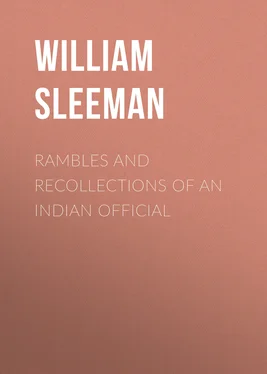William Sleeman - Rambles and Recollections of an Indian Official
Здесь есть возможность читать онлайн «William Sleeman - Rambles and Recollections of an Indian Official» — ознакомительный отрывок электронной книги совершенно бесплатно, а после прочтения отрывка купить полную версию. В некоторых случаях можно слушать аудио, скачать через торрент в формате fb2 и присутствует краткое содержание. Жанр: Путешествия и география, История, foreign_edu, foreign_antique, foreign_prose, на английском языке. Описание произведения, (предисловие) а так же отзывы посетителей доступны на портале библиотеки ЛибКат.
- Название:Rambles and Recollections of an Indian Official
- Автор:
- Жанр:
- Год:неизвестен
- ISBN:нет данных
- Рейтинг книги:4 / 5. Голосов: 1
-
Избранное:Добавить в избранное
- Отзывы:
-
Ваша оценка:
- 80
- 1
- 2
- 3
- 4
- 5
Rambles and Recollections of an Indian Official: краткое содержание, описание и аннотация
Предлагаем к чтению аннотацию, описание, краткое содержание или предисловие (зависит от того, что написал сам автор книги «Rambles and Recollections of an Indian Official»). Если вы не нашли необходимую информацию о книге — напишите в комментариях, мы постараемся отыскать её.
Rambles and Recollections of an Indian Official — читать онлайн ознакомительный отрывок
Ниже представлен текст книги, разбитый по страницам. Система сохранения места последней прочитанной страницы, позволяет с удобством читать онлайн бесплатно книгу «Rambles and Recollections of an Indian Official», без необходимости каждый раз заново искать на чём Вы остановились. Поставьте закладку, и сможете в любой момент перейти на страницу, на которой закончили чтение.
Интервал:
Закладка:
342
A 'dug-out' canoe is rather a shaky craft. When two or three are lashed together, and a native cot (chārpāi ) is stretched across, the passenger can make himself very comfortable. The boats are poled by men standing in the stern.
343
Ante , Chapter 24, note 1.
344
This prince is not included in the authentic dynastic lists given in the Chandēl inscriptions. He was probably a younger son, who never reigned. The principal authorities for the history of the Chandēl dynasty are A.S.R. , vol. ii, pp. 439-51; vol. xxi, pp. 77-90, and V. A. Smith, 'Contributions to the History of Bundēlkhand', in J.A.S.B. vol. 1 (1881), Part I, p. 1; and 'The History and Coinage of the Chandēl (Chandella) Dynasty' in Ind. Ant. , 1908, pp. 114-48. A brief summary will be found in Early History of India , 3rd ed. (1914), pp. 390-4. Most of the great works of the dynasty date from the period A.D. 950- 1200.
345
The long ridges of quartz traversing the gneiss are marked features in the scenery of Bundēlkhand.
346
The author always uses the phrase Central India as a vague geographical expression. The phrase is now generally used to mean an administrative division, namely, the group of Native States under the Central India Agency at Indore, which deals with about 148 chiefs and rulers of various rank. Central India in this official sense must not be confounded with the Central Provinces, of which the capital is Nāgpur.
347
On this lake theory, see ante , Chapter 14, note 13.
348
During a residence of six years in Bundēlkhand the editor came to the conclusion that most of the ancient artificial lakes were not constructed for purposes of irrigation. The embankments seem generally to have been built as adjuncts to palaces or temples. Many of the lakes command no considerable area of irrigable ground, and there are no traces of ancient irrigation channels. In modern times small canals have been drawn from some of the lakes.
349
The desolation of the ravines of the rivers of Central India and Bundēlkhand offers a very striking spectacle, presenting to the geologist a signal example of the effects of sub-aerial denudation.
350
This pretty custom is also described, in Tod's Rājasthān ; and is still common in Alwar, and perhaps in other parts of Rājputāna ( N.I. Notes and Queries , vol. ii (Dec. 1892), p. 152), It does not seem to be now known in the Gangetic valley.
351
Principalities, and the estates of the talukdārs of Oudh also descend to the eldest son. The author states (ante , Chapter 10, see text before note [10].) that the same rule applied in his time to the small agricultural holdings in the Sāgar and Nerbudda territories.
352
This statement is inexact; Hindoo daughters, as a rule, inherit nothing from their fathers; a Muhammadan daughter takes half the share of a son.
353
But it is only the smaller local ministerial officers who are secure in their tenure of office under native Governments; those on whose efficiency the well-being of village communities depends. The greatest evil of Governments of the kind is the feeling of insecurity which pervades all the higher officers of Government, and the instability of all engagements made by the Government with them, and by them with the people. [W. H. S.]
354
Ante , Chapter 23, text at note [8].
355
In the Gwālior territory, the Marāthā 'āmils' or governors of districts, do the same, and keep gangs of robbers on purpose to plunder their neighbours; and, if you ask them for their thieves, they will actually tell you that to part with them would be ruin, as they are their only defence against the thieves of their neighbours. [W. H. S.] These notions and habits are by no means extinct. In October, 1892, a force of about two hundred men, cavalry and infantry, was sent into Bundēlkhand to suppress robber gangs. Such gangs are constantly breaking out in that region, in most native states, and in many British districts. See ante , chapter 23, text following note [13].
356
My poor guide had as little sympathy with the prime ministers, whom the Tehrī Rājā put to death, as the peasantry of England had with the great men and women whom Harry the Eighth sacrificed. [W. H. S.] Ante , Chapter 23, beginning to note [9].
357
The cruel practice of impressment for the royal navy is authorized by a series of statutes extending from the reign of Philip and Mary to that of George III. Seamen of the merchant navy, and, with few exceptions, all seafaring men between the ages of eighteen and thirty-five, are liable, under the provisions of these harsh statutes, to be forcibly seized by the press-gang, and compelled to serve on board a man-of-war. The acts legalizing impressment were freely made use of during the Napoleonic wars, but since then have been little acted on, and no Government at the present day could venture to use them, though they have never been repealed. The fleet sent against the Russians in 1855 was the first English fleet ever manned without recourse to forcible impressment: see the article 'Impressment' by David Hannay, in Encyclopaedia Britannica , 11th ed., 1910. The work by J. B. Hutchinson entitled The Press- gang Afloat and Ashore (London: Nash, 1913) gives copious details of the infamous proceedings.
358
The Brahman chief of Jhānsī was originally a governor under the Peshwā. The treaty of November 18, 1817, recognized the then chief Rāmchand Rāo, his heirs and successors, as hereditary rulers of Jhānsī. Rāmchand Rāo was granted the title of Rājā by the British Government in 1832, and died without issue on August 20, 1835 (N.W.P. Gazetteer , 1st ed., vol. i, p. 296). See post , Chapter 29.
359
The chiefs of Jālaun also were officers under the Marātha Government of the Peshwā up to 1817. In consequence of gross misgovernment, an English superintendent was appointed in 1838, and the state lapsed to the British Government, owing to failure of heirs, in 1840 (ibid. p. 229).
360
Ante Chapter 23, note 13.
361
Lapse of years has increased the distance and the enchantment, so that modern agitators and sentimentalists discover marvellous excellences in the native Governments of the now remote past. The methods of government in the existing native states have been so profoundly modified by the influence of the Imperial Government that these states are no longer as instructive in the way of contrast as they were in the author's day.
362
The author consistently held the views above enunciated, and defended the policy of maintaining the native states. He was of opinion that the system of annexation favoured by Lord Dalhousie and his Council 'had a downward tendency, and tended to crush all the higher and middle classes connected with the land'. He considered that the Government of India should have undertaken the management of Oudh, but that it had no right to annex the province, and appropriate its revenues (Journey through the Kingdom of Oude , p. 22, &c.). Since 1858 the policy of annexation has been repudiated. See Sir W. Lee-Warner, The Protected Princes of India (Macmillan, 1894), and The Native States of India (1910).
Читать дальшеИнтервал:
Закладка:
Похожие книги на «Rambles and Recollections of an Indian Official»
Представляем Вашему вниманию похожие книги на «Rambles and Recollections of an Indian Official» списком для выбора. Мы отобрали схожую по названию и смыслу литературу в надежде предоставить читателям больше вариантов отыскать новые, интересные, ещё непрочитанные произведения.
Обсуждение, отзывы о книге «Rambles and Recollections of an Indian Official» и просто собственные мнения читателей. Оставьте ваши комментарии, напишите, что Вы думаете о произведении, его смысле или главных героях. Укажите что конкретно понравилось, а что нет, и почему Вы так считаете.












